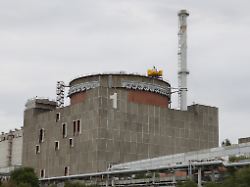Since Russia’s Ukraine War
Federal Office considers nuclear weapons attack to be more likely
March 19, 2024, 9:59 a.m
Listen to article
This audio version was artificially generated. More info | Send feedback
The President of the Federal Office for Radiation Protection considers the situation at the Zaporizhia nuclear power plant to be worrying. And that’s not all. She fears that “the risk of a crime involving radioactive materials or even a nuclear weapon attack” has become more likely.
In view of the ongoing war in Ukraine, the President of the Federal Office for Radiation Protection, Inge Paulini, recalled the ongoing risk to the nuclear power plants located there. In particular, the situation at Ukraine’s largest nuclear power plant, Zaporizhzhia, is “repeatedly cause for concern,” said Paulini.
The fighting, the power supply and the working conditions of the employees pose a particular risk. Everything must be done to ensure the cooling of all security-relevant systems, appealed Paulini. “Nuclear facilities should under no circumstances be drawn into military conflicts.”
Russian troops occupied the Zaporizhzhia nuclear power plant at the beginning of March 2022. Since then, due to the war, most of the lines that supply the system near the front with electricity have failed. A team from the International Atomic Energy Agency (IAEA) is constantly on site to monitor the situation in the largely decommissioned power plant. The experts keep reporting on military activities nearby.
The Federal Office for Radiation Protection has been monitoring the situation very closely since the outbreak of war in spring 2022 – and is also providing information about the possible effects of a nuclear incident on Germany. The authority still considers this to be limited. The emergency measures would probably be limited to agriculture and the marketing of agricultural products, the office said. However, if an incident involving a core meltdown were to occur in Zaporizhzhia, it is not to be expected that further measures to protect the population in Germany – such as the distribution of iodine tablets – would be necessary.
Civil and disaster protection is even more important
Federal Office President Paulini believes that a greater awareness of the importance of civil and disaster protection in this country is essential. Since the Russian attack on Ukraine, “the risk of a crime involving radioactive materials or even a nuclear weapon attack” has become more likely, said Paulini.
In this context, she also referred to the nationwide measuring network for radioactivity, which turns 50 this Tuesday. The approximately 1,700 probes, which are spread throughout Germany, monitor the radioactive radiation in the environment “around the clock,” explained Paulini. If the level measured at a measuring point exceeds a certain threshold, a message is automatically sent to the Federal Office’s on-call service, which then checks the values in more detail. Paulini praised this system as an “increase in security for everyone”.
The first probe went into operation in 1974 in Holzkirchen, Upper Bavaria. Against the backdrop of the Cold War and the simmering threat of nuclear war, a system for the automated detection of radioactive radiation was to be created.
The Chernobyl reactor accident in 1986 caused the most relevant deflections in the measurement system to date. In the coming years, the measurement network will be technically developed so that it becomes more resistant to external influences, such as cyber attacks, explained Paulini. In addition, there should be more probes in metropolitan areas in the future. Experts and representatives of state authorities will discuss the further development of the measuring network and its significance at a ceremony in Berlin this Tuesday and Wednesday.
